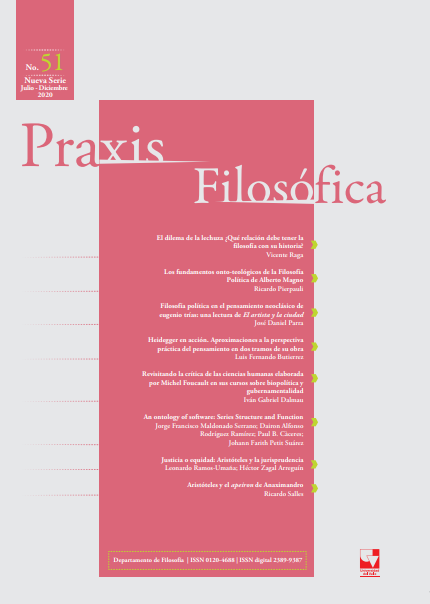Aristóteles y el apeiron de Anaximandro
Palabras claves:
cosmogonía ; zoogonía ; preplatónicos ; substancia ; cualidades ;Contenido principal del artículo
Este trabajo intenta resolver una tensión que existe en el modo en que Aristóteles concibe el apeiron de Anaximandro, la substancia a partir de la cual se genera el cosmos. En algunas partes del corpus, Aristóteles la presenta como un cuerpo básico que genera el cosmos por medio de un cambio de sus cualidades, pero en otras como un cuerpo compuesto de substancias básicas que el cual generaría el cosmos cuando éstas se separan la una de la otra. Como veremos, sin embargo, sólo este segundo modelo es el que Aristóteles realmente le atribuye a Anaximandro. Al final, se propone una hipótesis respecto de quién podría ser entonces la persona, o grupo de personas, que Aristóteles tiene en mente cuando se refiere al primer modelo.
Barnes, J. (1969). The Law of Contradiction. The Philosophical Quarterly, 19(77), 302-309. doi: 10.2307/2217842
Boeri, M. (1993). Aristóteles Física Libros I - II. Buenos Aires, Argentina: Biblos.
Burnet, J. (1914). Greek philosophy. Part I, Thales to Plato. Londres, Inglaterra: Macmillan.
Cooper, J. (2004). Knowledge, Nature, and the Good: Essays on Ancient Philosophy. Princeton, EUA: Princeton University Press.
Diels, H. (1882-1995). Simplicii in Aristotelis Physicorum. Libros Octo Commentaria. Berlín, Alemania: Reimer.
Diels, H., y Kranz, W. (1954). Die Fragmente der Vorsokratiker. Berlín, Alemania: Weidmann.
Fine, K. (1995). The problem of mixture. Pacific Philosophical Quarterly, 76(3-4), 266-369. doi: 10.1111/j.1468-0114.1995.tb00151.x
Finkelberg, A. (1993). Anaximander's Conception of the “Apeiron”. Phronesis, 38(3), 229-256.
Gilbert, O. (1907). Die meteorologischen Theorien des griechischen Altertums. Leipzig, Alemania: Teubner.
Graham, D. (2003). A testimony of Anaximenes in Plato. The Classical Quarterly, 53(2), 327-337.
Graham, D. (2010). The texts of early Greek philosophy: The complete fragments and selected testimonies of the major presocratics. Cambridge, Reino Unido: Cambridge University Press.
Gregory, A. (2016). Anaximander: A re-assessment. New York, EUA: Bloomsbury Academic.
Hölscher, U. (1953). Anaximander und die Anfange der Philosophie. Hermes, 81(3), 255-277.
Joachim, H. H. (1922). Aristotle on coming-to-be & passing-away (De generatione et corruptione). Oxford, Inglaterra: Clarendon Press.
Kahn, C. (1960). Anaximander and the origins of Greek cosmology. New York, EUA: Columbia University Press.
Kirk, G. (1955). Some Problems in Anaximander. The Classical Quarterly, 5(1/2), 21-38.
Kirk, G., Raven, J., y Schofield, M. (1983). The presocratic philosophers: A critical history with a selection of texts. Cambridge, Reino Unido: Cambridge University Press.
Laks, A. (2013). Raison pratique dans les cosmo-ontologies présocratiques. En G. Rossi, (Ed.), Nature and the best life: Exploring the natural bases of practical normativity in ancient philosophy (pp. 15-41). Hildesheim, Alemania: Georg Olms Verlag.
Laks, A., y Most, G.W. (Eds.) (2016). Early Greek Philosophy [9 Vols. - Loeb Classical Library]. Cambridge, EUA: Harvard University Press.
Laks, A. (2020). Historiographies de la Philosophie Ancienne. Neuf études. París, Francia : Les Belles Lettres.
Mansfeld, J. (2002). Aristotle, Theophrastus and Simplicius on Anaximander. Philosophia, 32, 25-46.
Mansfeld, J. (2011). Anaximander’s Fragment: Another Attempt. Phronesis, 56(1), 1-32.
Marcovich, M. (1986). Refutatio omnium haeresium. Berlín, Alemania: W. De Gruyter.
Moraux, P. (1965). Aristote. Du ciel. París, Francia: Belles lettres.
McDiarmid, J. B. (1953). Theophrastus on the Presocratic causes. Harvard Studies in Classical Philology, 61, 85-156. doi: 10.2307/310774
Rashed, M. (2005). Aristote. De la génération et la corruption. París, Francia: Belles lettres.
Ross, D. (1936). Aristotle. Physics. A Revised Text with Introduction and Commentary. Oxford, Inglaterra: Clarendon Press.
Ross, W. (1924). Aristotle's Metaphysics. A Revised Text with Introduction and Commentary. Oxford, Inglaterra: Clarendon Press.
Salles, R., y Molina, J. (2020). Alejandro de Afrodisia. De la Mixtura y el Crecimiento. Ciudad de México, México: UNAM.
Sharvy, R. (1983). Aristotle on Mixtures. The Journal of Philosophy, 80(8), 439-457. doi: 10.2307/2026162
Schenkl, H. (1900). Themistii in Aristotelis physica paraphrasis. Berlín, Alemania: Reimer.
Vernant, J. P. (1962). The Origins of Greek Thought. New York, EUA: Cornell University Press.
Vlastos, G. (1947). Equality and justice in early Greek cosmologies. Classical Philology, 42(3), 156-178.
Whitby, M. (1982). Quasi-elements in Aristotle. Mnemosyne, 35, 225-247.
Zeller, E. (1879-1892). Die Philosophie der Griechen in ihrer geschichtlichen Entwicklung. Leipzig, Alemania: O. R. Reisland.
Aceptado 2020-06-11
Publicado 2020-07-15
De acuerdo con nuestra política (Licencia Creative Commons CC BY-NC-SA 4.0) los artículos presentados y sometidos al proceso editorial en la revista Praxis Filosófica no tienen costo alguno para sus autores ni retribuciones económicas para la revista. El artículo de carácter inédito, producto de investigación o de algún proyecto que se presente a Praxis Filosófica, no podrá estar sometido a otro proceso de publicación durante el proceso que se lleve en nuestra revista.





